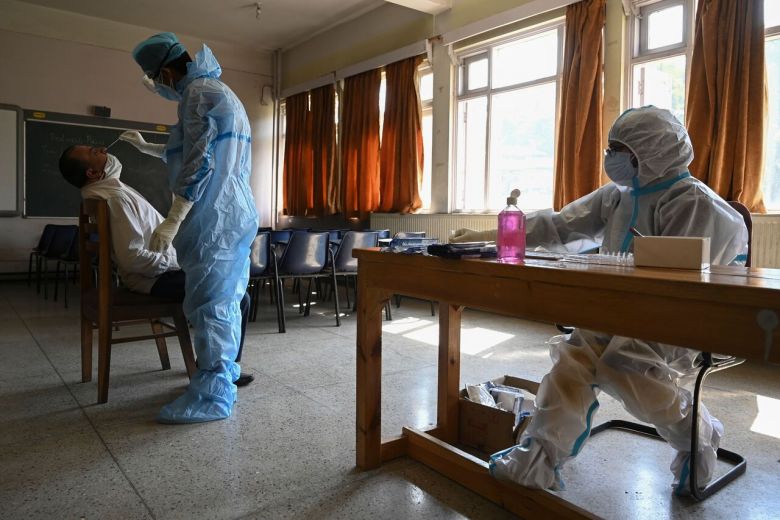Number of COVID-19 cases drop in India but experts urge caution
NEW DELHI — The number of new Covid-19 cases daily in India has continued to drop, giving rise to optimism that the pandemic has hit a plateau in the world’s second-most populous country.
On Tuesday (Oct 7), the health ministry said new cases recorded in the last 24 hours stood at 61,267, a figure confirming a nearly two-week downward trend. It hit 98,000 in mid-September.
The finance ministry, in its report on the economic outlook for September, said that the country may have crossed the peak for infections last month, setting the stage for economic recovery.
But it warned that the pandemic was far from over, a cautious approach mirrored by epidemiologists and health experts.
“We need to make sure this is sustained for two more weeks before we can speak confidently that the curve is flattened… There are factors coming into play which was not considered in the past,” Dr Randeep Guleria, director of All India Institute of Medical Sciences in Delhi, told The Straits Times.
Article continues after this advertisementHe noted that some big Hindu festivals are just around the corner, including Dussehra and Deepavali, as well as state festivities like Chhath Puja.
Article continues after this advertisement“These are social functions where people gather. If we don’t follow Covid-appropriate behaviour in terms of physical distancing, there may be a spurt.
“The second thing is, how will the virus behave during winter months? This is for northern India rather than the south.”
India, which currently has over 6.6 million cases and 103,569 deaths, imposed a strict lockdown in March, shutting down all economic activity and preventing people from going out of their houses. The restrictions have slowly been loosened.
In the latest of such easing, the federal government has allowed states to decide if they will reopen schools as well as cinema halls and theatres are due to open from October 15, subject to 50 per cent occupancy.
Much of the drop in infections has been attributed to the bigger cities, which have so far driven case numbers in India.
The state of Maharashtra, home to the financial hub of Mumbai and auto hub of Pune, for instance, has been among the worst affected. But the number of cases in the state has come down from 22,000 at the beginning of September to 10,244 on Monday.
Some experts, advising caution at the new numbers, said a big factor to consider is the situation in the rural areas, which were hit by the pandemic long after the cities.
“India is a large country and the epidemic is in different stages in different parts. In the lead are big cities, followed by smaller cities. Villages (rural India) are in the early phase of the pandemic. I am hoping once big cities come down, it will take the sting out of the epidemic,” said Indian epidemiologist Jayaprakash Muliyil
“Certain things are in favour of rural India. They have lesser (population) density,” he added.
Experts have also pointed to the problem of under-reporting.
Indian Council for Medical Research (ICMR) sero surveys, which checks for antibodies in the blood to detect Covid 19, have found that far more people were infected than official figures.
The latest survey found that one in 15 Indians was exposed to the coronavirus by August and ICMR officials have acknowledged that a large section of the population still remains vulnerable.
Testing data has also come in for some scrutiny.
“The numbers of confirmed cases are indeed going down but it’s hard to know if that is real. This is because the deployment of rapid antigen testing (RAT) has increased over the past few weeks,” said virologist Shahid Jameel.
“It is estimated that 40 to 50 per cent of all tests being done are RATs. These tests have a sensitivity of only about 50 per cent. Further, information is hard to come by on how many RATs and RTPCR are being done in states. The ratio is variable. In the absence of more granular data, one doesn’t know if the downward trend is real or due to less sensitive testing.”
RATs provides a result in less than 15 minutes but is also seen to be unreliable, with many false negatives. The RTPCR (reverse transcription polymerase chain reaction) test is regarded as the more reliable test but a result takes longer, from four to eight hours. Hence if more RATs are being done, the numbers could be deceptive.
Experts agree that at the end of the day much will depend on whether people continue to observe precautions or become lax with the economy opening up and case numbers coming down.
“Surges shall remain a constant feature for some foreseeable time as all activities other than education, hospitality and entertainment sectors have resumed, with very little real restrictions,” Professor Rajib Dasgupta, chairman of the centre for social medicine and community health at the Jawaharlal Nehru University.
“Data from a survey reported on Oct 4 indicates that only 44 per cent of Indians are wearing a mask even though awareness levels about them are at a high of 90 per cent. It is an ominous signal of things ahead if this is nationally representative .”
For more news about the novel coronavirus click here.
What you need to know about Coronavirus.
For more information on COVID-19, call the DOH Hotline: (02) 86517800 local 1149/1150.
The Inquirer Foundation supports our healthcare frontliners and is still accepting cash donations to be deposited at Banco de Oro (BDO) current account #007960018860 or donate through PayMaya using this link.
